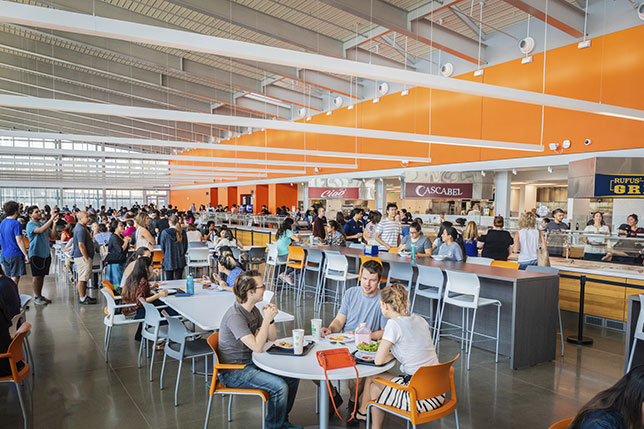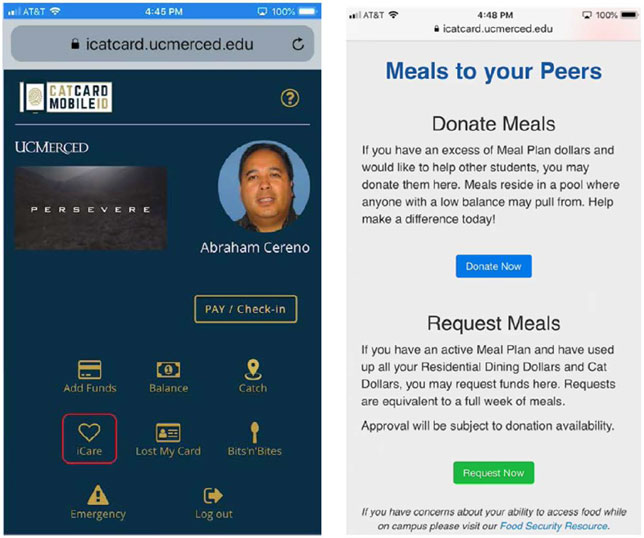App Helps Feed Students in Need
The University of California, Merced is addressing food insecurity on campus with a program that allows students to donate unused meal plan funds to peers.
Category: Student Systems and Services
Institution: University of California, Merced
Project: iCare App Program
Project lead: Abraham Cereno, associate director, CatCard Office
Tech lineup: Developed in-house

iCare allows students to confidentially donate or request funds for use at any dining location on campus.
In May 2016, University of California, Merced freshman Harrison Tom was finishing up his final exams when he realized he had a lot of money left over on his prepaid campus meal plan — more than he could use before the semester ended. "Reluctant to forfeit the remainder, Tom got creative," recalled Abraham Cereno, associate director of the university's CatCard Office. Tom used the money to buy 100 meal vouchers, and offered them up for free to fellow students on a UC Merced Facebook page.

Project lead Abraham Cereno
"Get y'all selves' fed and good luck on finals," wrote Tom. "Why let my money go to waste back to the university when I could help feed people who need the food? They are in college, they are hungry; I am in college, and I'm hungry. So it's definitely a good thing."
By the next morning, so many students were redeeming meal vouchers that the traditionally paper-based process was overwhelmed. "Vouchers at the time were printed, and the redemption process was manual, difficult to manage and not entirely secure," explained Cereno. "People on campus agreed that it made sense to donate meal plan dollars to hungry students, and CatCard and Dining Services staff collaborated to create a better process."
The result: iCare, an app developed in-house that allows students to donate their excess meal plan dollars to those in need. The project, led by Cereno and launched in January 2017, represents more than simply enabling generosity; it's also about supporting students' academic success.

iCare mobile interface
"An enrolled student once said to me, ‘It's 8:00 pm and I have been preparing and studying for three mid-terms and finals, but I have not eaten for the last 24 hours because my meal plan has depleted and Pantry [UC Merced's free food bank for students in need] is closed for the day,'" recounted Cereno. "This is one example of the challenges our students face every term. Students who are food insecure tend to suffer academically as a result. As students and university staff, it is our responsibility to help others around us and make the campus as prosperous as can be. One main way we can do that is by eradicating hunger throughout the campus and help all students focus on academics."
To access iCare, users log in to the secure iCatCard campus card system portal via desktop, tablet or smartphone. They can then confidentially donate or request funds for use at any dining location on campus. Built-in safeguards prevent users from over-donating or taking advantage of the program. In order to donate, students must have an active meal plan with enough funds for themselves to last through the full semester. Students requesting funds must have a balance of less than $50, and are eligible to receive $125 (equivalent to a week's worth of meals) at a time, no more than three times per semester. Approval of student requests is subject to availability of funds in the donation pool. Administrators can track all usage data — demographics, trends in student donations and requests, etc. — through iCare's integration with the university's CBORD-based campus card system.
In its first two years since launch, iCare provided a total of $247,198 in meal funds (or 39,552 individual meals) to students in need.
Statistics have shown that nearly 60 percent of students have experienced food insecurity at some point while being enrolled, according to Cereno. That can include not only students who have run out of funds on their meal plan, but also students who are homeless, can't afford healthy foods, come from low-income families, have strict dietary restrictions or health disorders, struggle to balance a full schedule of school and work, and more. "If resources to manage students' emergency needs are not put into place in time and appropriately, they may leave school for the semester, and then they might never come back," he said. "We must find whatever is in our power to help our students stay on course. If that is alleviating student hunger, then we need to continue to be creative and find ways to make an impact."
Return to Campus Technology Impact Awards Home
About the Author
Rhea Kelly is editor in chief for Campus Technology, THE Journal, and Spaces4Learning. She can be reached at [email protected].